

Alvin
10 Myths About Body Fat - HowStuffWorks. Your body fat conserves your energy, keeps you warm, cushions your organs and allows the body to maintain the basic functions that keep you alive.

Your ideal body fat percentage will be different from that of other people. How much each person has depends on some things that can't be changed including age, bone structure, gender and genes, in addition to things we can change, such as whether we lead an active or sedentary lifestyle. Too much body fat is associated with chronic disease such as type 2 diabetes, cardiovascular disease and some cancers. But the pendulum can swing too far in the other direction.
You can have too little body fat, which poses a different set of health issues. A body needs to have a certain percentage of fat in order for it to be able to function: Women need about 13 percent body fat and men about 3 percent. Cockroaches have distinct personalities. If you were to poll 100 people about their least favorite insect, the top prize for most hated would go to cockroaches.

They aren't poisonous. They run and hide when they see us. Presence, Not Praise: How To Cultivate a Healthy Relationship with Achievement. By Maria Popova Why instilling admiration for hard work rather than raw talent is the key to fostering a well-adjusted mind.
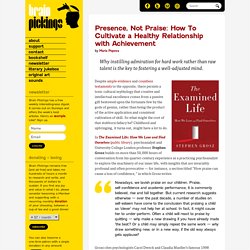
Despite ample evidence and countless testaments to the opposite, there persists a toxic cultural mythology that creative and intellectual excellence comes from a passive gift bestowed upon the fortunate few by the gods of genius, rather than being the product of the active application and consistent cultivation of skill. So what might the root of that stubborn fallacy be? Childhood and upbringing, it turns out, might have a lot to do. Nowadays, we lavish praise on our children. What It Means When Your Snot Is Green. Aldous Huxley on Drugs, Democracy, and Religion. By Maria Popova “Generalized intelligence and mental alertness are the most powerful enemies of dictatorship and at the same time the basic conditions of effective democracy.”
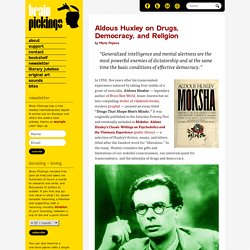
In 1958, five years after his transcendent experience induced by taking four-tenths of a gram of mescalin, Aldous Huxley — legendary author of Brave New World, lesser-known but no less compelling writer of children’s books, modern prophet — penned an essay titled “Drugs That Shape Men’s Minds.” "Study Less, Study Smart": The Best Ways to Retain More in Less Time. Try a Writing Meditation If Sitting Still Isn’t Working For You. What's earwax made of? - HowStuffWorks. It might seem weird that humans produce wax.

After all, that's typically considered the domain of bees. But as anyone who's ever used a cotton swab knows, human ears generate a fair amount of the substance. Why Emotional Excess is Essential to Writing and Creativity. I heart intelligence 9 ways to stop overthinking. Freud’s Life and Legacy, in a Comic. By Maria Popova “You have to listen carefully.
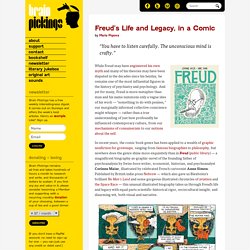
The unconscious mind is crafty.” While Freud may have engineered his own myth and many of his theories may have been disputed in the decades since his heyday, he remains one of the most influential figures in the history of psychiatry and psychology. And yet for many, Freud is more metaphor than man and his name summons only a vague idea of his work — “something to do with penises,” our marginally informed collective conscience might whisper — rather than a true understanding of just how profoundly he influenced contemporary culture, from our mechanisms of consumerism to our notions about the self.
From how his own childhood informed his ideas to his most famous cases, the captivating story weaves its way through Freud’s life to shed light on both the man and his metaphors for the mind. Freud is absolutely fantastic from cover to cover. Images courtesy of Nobrow Donating = Loving Brain Pickings has a free weekly newsletter. Share on Tumblr. Which Dictator Killed The Most People? They say that it takes compassion for humanity, love for country and a strong pursuit of justice and mercy, to become a strong and respected leader of the masses.
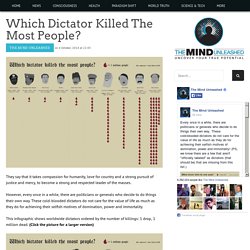
However, every once in a while, there are politicians or generals who decide to do things their own way. These cold-blooded dictators do not care for the value of life as much as they do for achieving their selfish motives of domination, power and immortality. This infographic shows worldwide dictators ordered by the number of killings: 1 drop, 1 million dead. (Click the picture for a larger version) Apparently, Hitler and Stalin combined killed less people that Mao Zedong… Disclaimer: There is a mistake in this infographic. Everyone’s a Comedian. Driving to work the other day, I heard an album title announced on the radio, If It Weren’t for Venetian Blinds, It’d Be Curtains for Us All, and I burst out laughing.
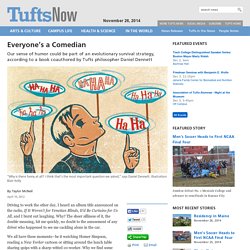
Why? The sheer silliness of it, the double meaning, hit me quickly, no doubt to the amusement of any driver who happened to see me cackling alone in the car. 8 Amazing Inexpensive Countries To Live In For A Year. Have you ever thought about chucking it all and moving to a place where the greenback goes farther?

Emotional Intelligence Quiz. The Language of Lying: Animated Primer on How to Detect Deception. Friedrich Nietzsche on Why a Fulfilling Life Requires Embracing Rather than Running from Difficulty. By Maria Popova A century and a half before our modern fetishism of failure, a seminal philosophical case for its value.
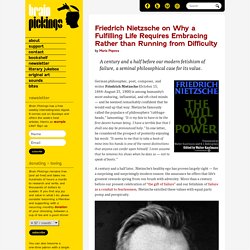
German philosopher, poet, composer, and writer Friedrich Nietzsche (October 15, 1844–August 25, 1900) is among humanity’s most enduring, influential, and oft-cited minds — and he seemed remarkably confident that he would end up that way. John Keats’s Porridge: The Favorite Recipes of Beloved Poets. October 22, 1964: Jean-Paul Sartre Becomes the First Person to Decline the Nobel Prize. By Maria Popova “A writer who adopts political, social, or literary positions must act only with the means that are his own — that is, the written word.”
Despite its surprisingly dark origin, the Nobel Prize is regarded as the highest honor bestowed upon a human being. Among its diverse laureates are a number of meta-outliers — people exceptional not only for the work that merited the prize but also for their atypical position within the Nobel ecosystem itself: Marie Curie became not only the first woman awarded a Nobel Prize but also the first and, for decades, the only person to win a Nobel in two different sciences; Aung San Suu Kyi is the only laureate who received the prize while under house arrest; Ernest Hemingway accepted his with a short and piercing speech that is itself prize-worthy. But the greatest outlier of all is French philosopher, writer, and political activist Jean-Paul Sartre. Sartre wrote: 20 Badass Alternative Versions Of Cartoon Characters.
Four Ways to Use Your Dark Side for Good (and Fight Evil in Others) The Artist and the Anguish of the American Dream: Zadie Smith’s Love-Hate Letter to New York. The History of the English Language, Animated. The Secret of Life from Steve Jobs in 46 Seconds. William Faulkner on Writing, the Human Dilemma, and Why We Create: A Rare 1958 Recording.
How to Navigate the Murky Waters of Workplace Friendships: Wisdom from Adam Smith and Aristotle. By Maria Popova. Fenimore Cooper’s Literary Offenses: 18 Rants by Mark Twain. A Life Worth Living: Albert Camus on Our Search for Meaning and Why Happiness Is Our Moral Obligation. By Maria Popova Why “the demand for happiness and the patient quest for it” isn’t a luxury or a mere need but our existential duty. “To decide whether life is worth living is to answer the fundamental question of philosophy,” Albert Camus wrote in his 119-page philosophical essay The Myth of Sisyphus in 1942. “Everything else … is child’s play; we must first of all answer the question.” Joni Mitchell on Freedom, the Source of Creativity, and the Dark Side of Success.
By Maria Popova “How does a person create a song? A lot of it is being open… to encounter and to… be in touch with the miraculous.” At the age of eight, Joni Mitchell (b. November 7, 1943) contracted polio during the last major North American epidemic of the disease before the invention of the polio vaccine. The Nietzsche Family Circus. How to Think Like Sherlock Holmes: Lessons in Mindfulness and Creativity from the Great Detective.
By Maria Popova “A man’s brain originally is like a little empty attic, and you have to stock it with such furniture as you choose.” John Cleese on the 5 Factors to Make Your Life More Creative. By Maria Popova “Creativity is not a talent. Be Like Water: The Philosophy and Origin of Bruce Lee’s Famous Metaphor for Resilience. My Ideal Bookshelf: Famous Artists and Writers Select Their All-Time Favorite Books. By Maria Popova. Agnes Martin on Art, Happiness, Pride, and Failure: A Rare Vintage Interview with the Reclusive Artist. Barbara Walters on the Art of Conversation, How to Talk to Bores, and What Truman Capote Teaches Us About Being Interesting. Homeless People Were Asked To Write Down A Fact About Themselves. Their Answers May Surprise You.
Misc. Darwin’s Battle with Anxiety. There's More to Life Than Being Happy. The Oppressed Majority: A Poignant French Short Film about a World in Which Men Are Subject to Sexism. Health and Fitness. Psychology. Consciousness. Pondering. Questionable New Age Stuff. Information and How-to's.